#women writing women
Text
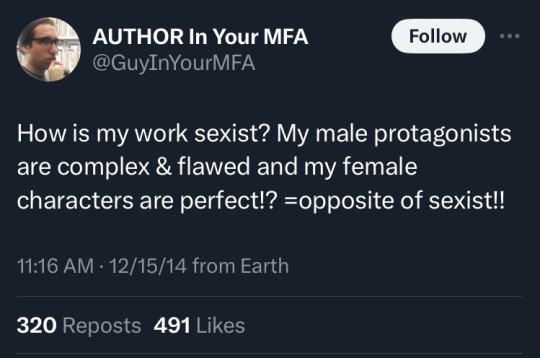
i think about this tweet Every Time i see people scared to write women with flaws bc they think it'll come off as sexist. cannot believe this is nearly a decade old. Ahead Of Its Time.....
#not just fandom writers. this also includes some very sweet very anxious people in irl writing group#clutching you by the shoulders. Make Your Women Crazier.#For Your Health And Mine Alike .
43K notes
·
View notes
Text
I wish we had more female characters like Eleanor Shellstrop. One of the most unlikable people you've ever met. Read a Buzzfeed article on most rude things you can do on a daily basis and decided to use that as a list of goals. Makes everyone's day worse just by being there. Dropped a margarita mix on the ground and tried to pick it up, only to get hit by a row of shopping carts which pushed her into the road where she was hit by a boner pill delivery truck, killing her instantly. Cannot keep a romantic partner despite being bisexual. Had a terrible childhood but will die before she gets therapy. Best employee at a scam company. Just the worst but also can't help but root for her to improve.
Absolute loser. Girl-failure. Bad at almost everything. Literally perfect female character.
#eleanor shellstrop#you know i was thinking about how we hold female characters to such high standards#and severely criticize bitchy female characters while praising asshole male characters#and then i remembered eleanor and realized that she is the perfect example of how to write an asshole woman that the audience likes#the worse she is the more i'm drawn to her (and honestly same for tahani)#we need more cringe-fail women who nobody likes (for good reason)#the good place#female characters#writing women#girl failure#girl loser#she's so mean#i love her#my favorite#fucking asshole#iconic#the good place eleanor#tgp#tgp eleanor#kristen bell
45K notes
·
View notes
Text
things to ask yourself when designing a female character:
how much blood is she covered in
are her eyes filled with madness
can she rip things to shreds with her fingernails
#female characters#female character design#character design#feral women#writing#writer#writing things#writer things#unhinged women#writerblr#writingblr#writeblr#writblr#writing community#creative writing#writers of tumblr#writer stuff#writing stuff#writing women
19K notes
·
View notes
Text

Oh alice..you would have loved Tim pls don't end up like him <3
#design might change as we go on!!!#also “jonathan sims pls stop writing hot women challenge”#he is losing#my trashy art#tmagp#tmagp fanart#the magnus protocol fanart#the magnus protocol#alice dyer#alice dyer fanart#alice tmagp#alice tmagp fanart
9K notes
·
View notes
Text
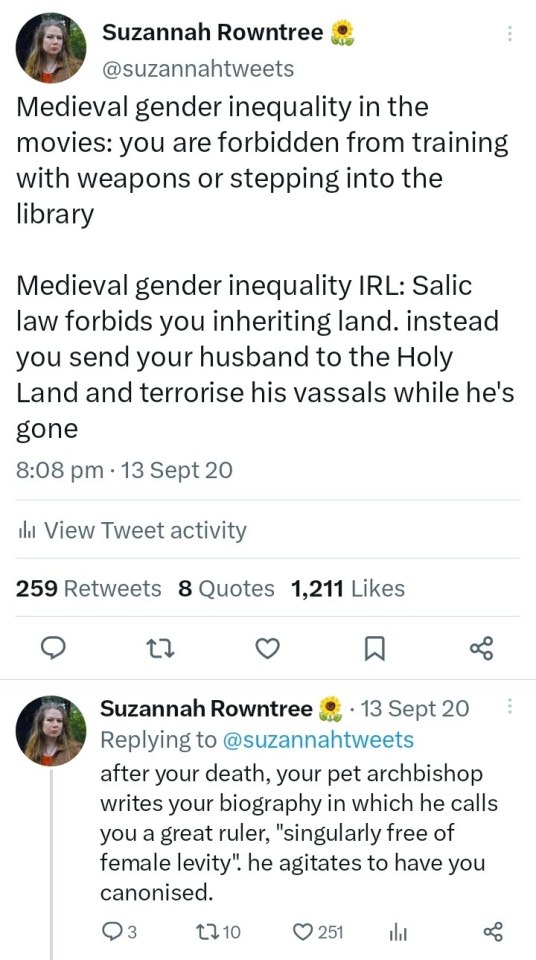
all RIGHT:
Why You're Writing Medieval (and Medieval-Coded) Women Wrong: A RANT
(Or, For the Love of God, People, Stop Pretending Victorian Style Gender Roles Applied to All of History)
This is a problem I see alllll over the place - I'll be reading a medieval-coded book and the women will be told they aren't allowed to fight or learn or work, that they are only supposed to get married, keep house and have babies, &c &c.
If I point this out ppl will be like "yes but there was misogyny back then! women were treated terribly!" and OK. Stop right there.
By & large, what we as a culture think of as misogyny & patriarchy is the expression prevalent in Victorian times - not medieval. (And NO, this is not me blaming Victorians for their theme park version of "medieval history". This is me blaming 21st century people for being ignorant & refusing to do their homework).
Yes, there was misogyny in medieval times, but 1) in many ways it was actually markedly less severe than Victorian misogyny, tyvm - and 2) it was of a quite different type. (Disclaimer: I am speaking specifically of Frankish, Western European medieval women rather than those in other parts of the world. This applies to a lesser extent in Byzantium and I am still learning about women in the medieval Islamic world.)
So, here are the 2 vital things to remember about women when writing medieval or medieval-coded societies
FIRST. Where in Victorian times the primary axes of prejudice were gender and race - so that a male labourer had more rights than a female of the higher classes, and a middle class white man would be treated with more respect than an African or Indian dignitary - In medieval times, the primary axis of prejudice was, overwhelmingly, class. Thus, Frankish crusader knights arguably felt more solidarity with their Muslim opponents of knightly status, than they did their own peasants. Faith and age were also medieval axes of prejudice - children and young people were exploited ruthlessly, sent into war or marriage at 15 (boys) or 12 (girls). Gender was less important.
What this meant was that a medieval woman could expect - indeed demand - to be treated more or less the same way the men of her class were. Where no ancient legal obstacle existed, such as Salic law, a king's daughter could and did expect to rule, even after marriage.
Women of the knightly class could & did arm & fight - something that required a MASSIVE outlay of money, which was obviously at their discretion & disposal. See: Sichelgaita, Isabel de Conches, the unnamed women fighting in armour as knights during the Third Crusade, as recorded by Muslim chroniclers.
Tolkien's Eowyn is a great example of this medieval attitude to class trumping race: complaining that she's being told not to fight, she stresses her class: "I am of the house of Eorl & not a serving woman". She claims her rights, not as a woman, but as a member of the warrior class and the ruling family. Similarly in Renaissance Venice a doge protested the practice which saw 80% of noble women locked into convents for life: if these had been men they would have been "born to command & govern the world". Their class ought to have exempted them from discrimination on the basis of sex.
So, tip #1 for writing medieval women: remember that their class always outweighed their gender. They might be subordinate to the men within their own class, but not to those below.
SECOND. Whereas Victorians saw women's highest calling as marriage & children - the "angel in the house" ennobling & improving their men on a spiritual but rarely practical level - Medievals by contrast prized virginity/celibacy above marriage, seeing it as a way for women to transcend their sex. Often as nuns, saints, mystics; sometimes as warriors, queens, & ladies; always as businesswomen & merchants, women could & did forge their own paths in life
When Elizabeth I claimed to have "the heart & stomach of a king" & adopted the persona of the virgin queen, this was the norm she appealed to. Women could do things; they just had to prove they were Not Like Other Girls. By Elizabeth's time things were already changing: it was the Reformation that switched the ideal to marriage, & the Enlightenment that divorced femininity from reason, aggression & public life.
For more on this topic, read Katherine Hager's article "Endowed With Manly Courage: Medieval Perceptions of Women in Combat" on women who transcended gender to occupy a liminal space as warrior/virgin/saint.
So, tip #2: remember that for medieval women, wife and mother wasn't the ideal, virgin saint was the ideal. By proving yourself "not like other girls" you could gain significant autonomy & freedom.
Finally a bonus tip: if writing about medieval women, be sure to read writing on women's issues from the time so as to understand the terms in which these women spoke about & defended their ambitions. Start with Christine de Pisan.
I learned all this doing the reading for WATCHERS OF OUTREMER, my series of historical fantasy novels set in the medieval crusader states, which were dominated by strong medieval women! Book 5, THE HOUSE OF MOURNING (forthcoming 2023) will focus, to a greater extent than any other novel I've ever yet read or written, on the experience of women during the crusades - as warriors, captives, and political leaders. I can't wait to share it with you all!
#watchers of outremer#medieval history#the lady of kingdoms#the house of mourning#writing#writing fantasy#female characters#medieval women#eowyn#the lord of the rings#lotr#history#historical fiction#fantasy#writing tip#writing advice
29K notes
·
View notes
Text
“You just wrote your medieval fantasy setting to have medieval gender roles and homophobia and prejudice because you secretly fantasize about being able to be sexist and homophobic in a land with no PoC without any pushback! It’s fantasy, there’s dragons and wizards, it doesn’t have to have prejudice unless you, the writer, want it like that! In *my* D&D setting, there’s no sexism or homophobia, so that gay transgender women of all races can be holy knights fighting to protect the good kingdom from the endless hordes of the evil dark race that has threatened its borders for a thousand years!”
#writing#medieval fantasy#medieval women#fantasy#d&d#d&d 5e#dungeons and dragons#ttrpg#books#novels#worldbuilding
4K notes
·
View notes
Text
my trans girlfriend tells me about how they don't experience bottom dysphoria with her penis because she doesn't view it as a "male" organ and feels like it's a part of her womanhood. i love them for that, she's right; that is simply just a part of her, and she is a woman, so that makes it part of her womanhood. being trans is beautiful, i love her
#trans#transgender#lgbtqia#lgbtq#lgbt#queer#mtf#trans woman#trans women#trans girl#transsexual#nonbinary#enby#non binary#genderqueer#our writing
7K notes
·
View notes
Text
when hozier said "if im a pagan of the good times, my lover's the sunlight" and when hozier said "no grave can hold my body down, i'll crawl home to her" and when hozier said "i slithered here from eden just to sit outside your door" and when hozier said "heaven is not fit to house a love like you and i" and when hozier said-
#this man just writes about women like women write about women yk#also yes ive used two of these lyrics as sapphic fic titles#hozier#take me to church#work song#from eden#francesca#unreal unearth#sapphic#lesbian#sarahs having a Lesbian Moment
10K notes
·
View notes
Text
people will write think pieces on why they can't enjoy female characters or f/f because they aren't fuckable to them or crack "hates women so much he's gay jokes" but if someone even cracks a joke about hating men people start having a nuclear meltdown
2K notes
·
View notes
Text
ok alphys was a character ahead of her time and too good for this damn fandom honestly. she isn't some evil gaslighting lying cringey manipulator who only exists as comic relief for the love of god look at her with eyes less poisoned by cynicism and irony. she is a love letter to... well, a lot of things. a love letter to "cringey" people, to video game fans, to people who try to drown their sadness in fiction. she's so achingly relatable to so many of us that it really feels like toby knows his demographic like the back of his hand. we've all met someone like alphys. maybe we are that someone- awkward, nerdy, can't get over their past mistakes, terrible at phone calls, far more eloquent online than in person, only wants to make people like them to distract them from the fact that they don't like themself. normally, this character archetype is the butt of a great deal of jokes- just a gross nerd who needs to touch grass. but alphys is different. she is, as i said, a love letter. she is one of the best-developed and most complex characters in the game. her nerdiness isn't "fixed" or mocked, it's celebrated. her unabashed love for her interests and her 100% attitude is a big reason why undyne loves her. games, especially in 2015 and before, are not often so genuinely kind to characters like alphys! and in deltarune, too- alphys is still a nerd, despite not being nearly as traumatized as her undertale counterpart. her rambling about shows she loves is a constant across all universes, a fundamental and important and good part of who she is.
and i just think that's very kind, and very important.

#undertale#deltarune#alphys undertale#having some thoughts about certain utdr women tonight💙 this makes me wanna try rewriting that undyne and gaster fic#i tried to write a while ago and got sidetracked
13K notes
·
View notes
Text
20 "we are each other's safe place" romance prompts:
(feeling emo now that I'm officially back :') feel free to useee and tag me when yall write!!)
holding each other close in silence
yearning for just one hug after being separated for so so long... </3
"i can't seem to take neither my eyes, nor my mind off of you, [name]." :'')
noticing that bright smile of theirs after you compliment them. [my heart. omds]
them rushing into your embrace after a long day
"let me ask my partner." or,
"oh, my partner at home is waiting for me, i better get going :)"
being ur partner's mum's favorite, hehehe
^ "ma... how come they're getting head rubs from you often while i rarely do?"
sulking to get attention from them and they get cuteness aggression over you (> < my cuteness aggress. for mr. japan goes crazy guys!!)
being you comes easy with them ♡
being emotionally available to one another, and having each other and knowing you're not alone <3
when they're affirmative and expect affirmations from you <communication is the best trope>
cuddling and cozying up together, being all physical but not sexual ツ✰
them wrapping their hand around yours whenever walking together
when it's their smile, that's just enough to brighten your day :')
loving and living and actually looking forward to tomorrow with them,
^ "you make me want to be a better person."
"smile for me" or, "twirl for me" :))
searching for each other in a crowded rooms, finding each other everywhere (this is just love guys, top tier.)
#writer prompts#otp prompts#dialogue prompts#romance writing#imagine your otp#writeblr#urfriendlywriter#writing prompts#writing inspiration#romance prompts writing#angsty romance#writing romance#romance prompts#soft prompts for lovers#soft dialogue prompts#soft prompts#soft gestures#gestures that says i love you#couple prompts#writing prompt#prompt list#writers of tumblr#writers on tumblr#writing inspo#writing ideas#otp writing#otp things#otp ideas#women writers#otp drabble prompts
3K notes
·
View notes
Text
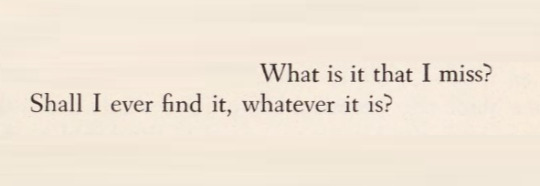
Sylvia Plath, from The Collected Poems of Sylvia Plath; "Three Women,"
1K notes
·
View notes
Text
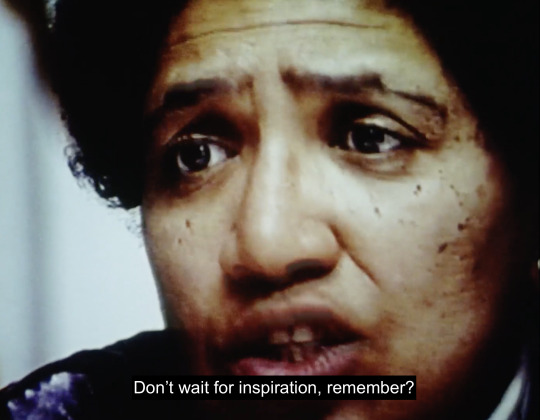
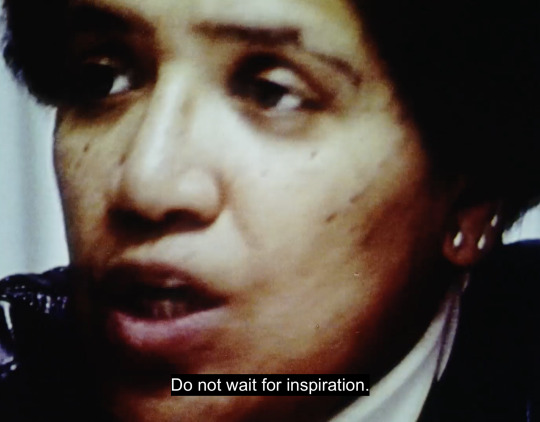
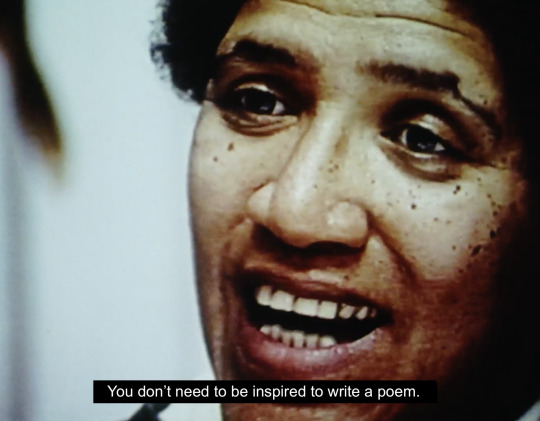
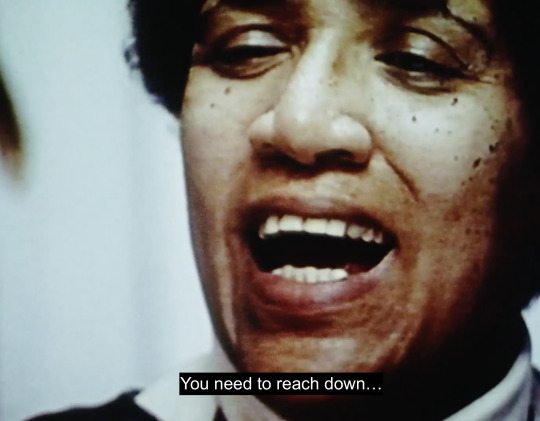
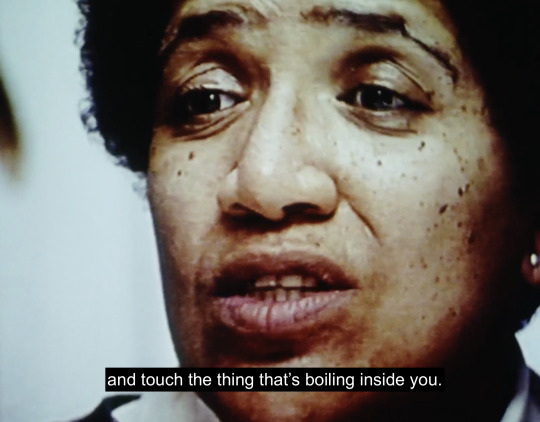

Audre Lorde to her students during a poetry workshop, as shown in A Litany for Survival: The Life and Work of Audre Lorde (1996) dir. by Ada Gay Griffin and Michelle Parkerson
#A Litany for Survival: The Life and Work of Audre Lorde#Audre Lorde#Black women#Black feminism#film#interviews#on writing#edited because I did not originally upload the complete quotation. the last screenshot was added 9-25.
12K notes
·
View notes
Text
you're grabbing lunch with a nice man and he gives you that strange grimace-smile that's popular right now; an almost sardonic "twist" of his mouth while he looks literally down on you. it looks like he practiced the move as he leans back, arms folded. he just finished reciting the details of NFTs to you and explaining Oppenheimer even though he only watched a youtube about it and hasn't actually seen it. you are at the bottom of your wine glass.
you ask the man across from you if he has siblings, desperately looking for a topic. literally anything else.
he says i don't like small talk. and then he smiles again, watching you.
a few years ago, you probably would have said you're above celebrity gossip, but honestly, you've been kind of enjoying the dumb shit of it these days. with the rest of the earth burning, there's something familiar and banal about dragging ariana grande through the mud. you think about jeanette mccurdy, who has often times gently warned the world she's not as nice as she appears. you liked i'm glad my mom died but it made you cry a lot.
he doesn't like small talk, figure out something to say.
you want to talk about responsibility, and how ariana grande is only like 6 days older than you are - which means she just turned 30 and still dresses and acts like a 13 year old, but like sexy. there's something in there about the whole thing - about insecurity, and never growing up, and being sexualized from a young age.
people have been saying that gay people are groomers. like, that's something that's come back into the public. you have even said yourself that it's just ... easier to date men sometimes. you would identify as whatever the opposite of "heteroflexible" is, but here you are again, across from a man. you like every woman, and 3 people on tv. and not this guy. but you're trying. your mother is worried about you. she thinks it's not okay you're single. and honestly this guy was better before you met, back when you were just texting.
wait, shit. are you doing the same thing as ariana grande? are you looking for male validation in order to appease some internalized promise of heteronormativity? do you conform to the idea that your happiness must result in heterosexuality? do you believe that you can resolve your internal loneliness by being accepted into the patriarchy? is there a reason dating men is easier? why are you so scared of fucking it up with women? why don't you reach out to more of them? you have a good sense of humor and a big ol' brain, you could have done a better job at online dating.
also. jesus christ. why can't you just get a drink with somebody without your internal feminism meter pinging. although - in your favor (and judgement aside) in the case of your ariana grande deposition: you have been in enough therapy you probably wouldn't date anyone who had just broken up with their wife of many years (and who has a young child). you'd be like - maybe take some personal time before you begin this journey. like, grande has been on broadway, you'd think she would have heard of the plot of hamlet.
he leans forward and taps two fingers to the table. "i'm not, like an andrew tate guy," he's saying, "but i do think partnership is about two people knowing their place. i like order."
you knew it was going to be hard. being non-straight in any particular way is like, always hard. these days you kind of like answering the question what's your sexuality? with a shrug and a smile - it's fine - is your most common response. like they asked you how your life is going and not to reveal your identity. you like not being straight. you like kissing girls. some days you know you're into men, and sometimes you're sitting across from a man, and you're thinking about the power of compulsory heterosexuality. are you into men, or are you just into the safety that comes from being seen with them? after all, everyone knows you're failing in life unless you have a husband. it almost feels like a gradebook - people see "straight married" as being "all A's", and anything else even vaguely noncompliant as being ... like you dropped out of the school system. you cannot just ignore years of that kind of conditioning, of course you like attention from men.
"so let's talk boundaries." he orders more wine for you, gesturing with one hand like he's rousing an orchestra. sir, this is a fucking chain restaurant. "I am not gonna date someone who still has male friends. also, i don't care about your little friends, i care about me. whatever stupid girls night things - those are lower priority. if i want you there, you're there."
he wasn't like this over text, right? you wouldn't have been even in the building if he was like this. you squint at him. in another version of yourself, you'd be running. you'd just get up and go. that's what happens on the internet - people get annoyed, and they just leave. you are locked in place, almost frozen. you need to go to the bathroom and text someone to call you so you have an excuse, like it's rude to just-leave. like he already kind of owns you. rudeness implies a power paradigm, though. see, even your social anxiety allows the patriarchy to get to you.
you take a sip of the new glass of wine. maybe this will be a funny story. maybe you can write about it on your blog. maybe you can meet ariana grande and ask her if she just maybe needs to take some time to sit and think about her happiness and how she measures her own success.
is this settling down? is this all that's left in your dating pool? just accepting that someone will eventually love you, and you have to stop being picky about who "makes" you a wife?
you look down to your hand, clutching the knife.
#writeblr#this is a mashup of like 3 dates i accidentally went on lol#by that i mean that i was out with a woman on a date in 2 of these situations#and a man just. joined us. and we were too awkward to say anything while he tried to ''date'' me#& one was a longterm friend that i was like. you what????#like he's nice he's a doctor and my mom was SO happy she was like raquel think about it#''it's a perfect love story you grew up together and reconnected as adults and like the same things and he's friends with ur brother#and his sister is one of ur close friends!!!''#yes but alas. he is a boy . she only likes girls. can i make it any more obvious#anyway im tryna write about like the force of male attention being actually incredibly ingrained to women like we are SUPPOSED to like it#it's seen as the only important thing#even if ur gay#and it's a nuanced thing idk#and while rn i i.d. as lesbian#like .... it wouldn't be UNTRUE to say i am probably like ''cusp bisexual'' bc i CAN experience attraction to men bc like .#sexuality is fluid...#don't tell straight ppl tho bc they do not understand the concept that ppl don't necessarily need a solid everlasting label#they're like GET in the BOX#if ur gay & in boston i'm 30 and pretty please come kiss me.#(i usually only date older ppl sorry in advance tho)
3K notes
·
View notes
Text
On Being a Powerful Speaker
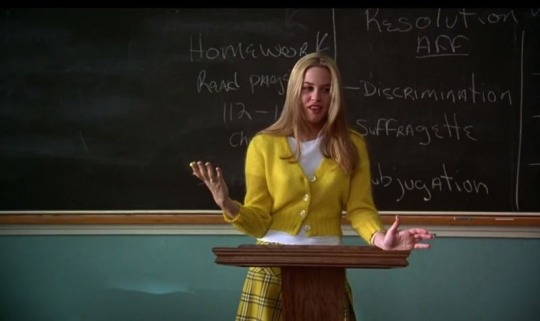
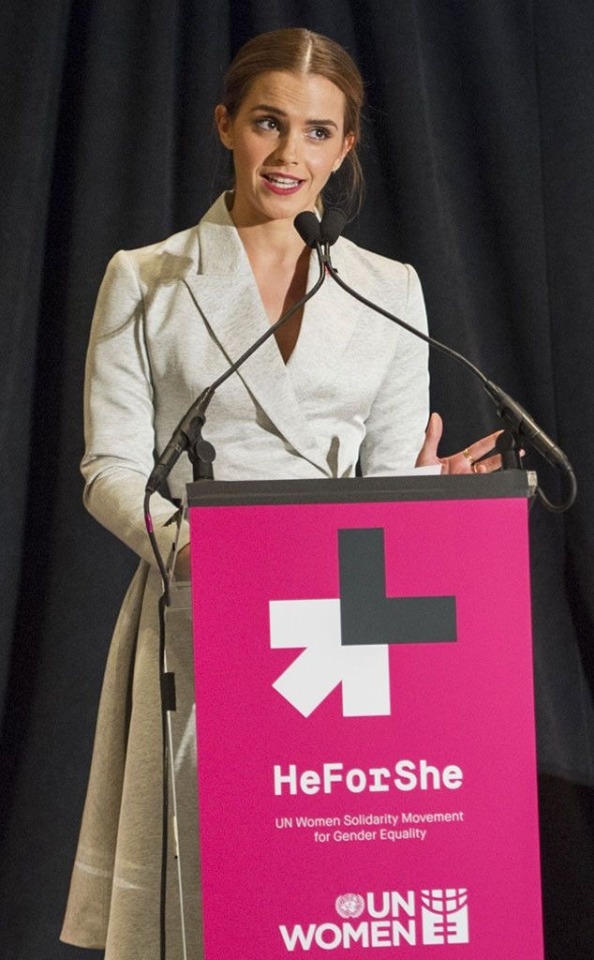

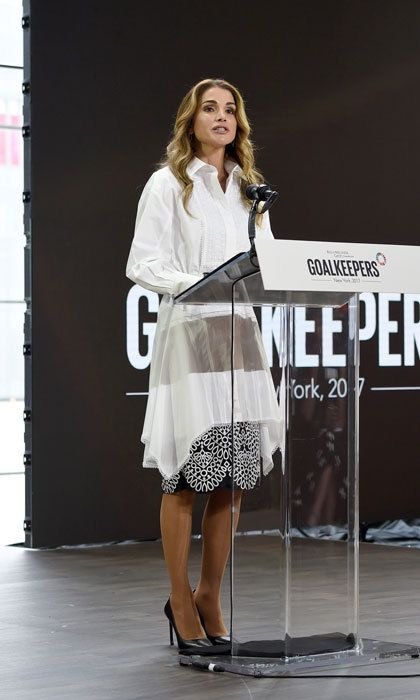
in order to be a good speaker, you have to be a good writer.
that doesn’t mean publishing 100 books and making it on NYT’s best selling list.
writing your thoughts, challenging your own assumptions and stances, writing about “controversial” ideas and playing the devil’s advocate, questioning the known, will allow your mind to become clearer on what you truly stand for. It will allow you to understand exactly who you are and what you believe in. It will help untangle all the jumble in your mind because you have to pen down your thoughts. Writing things down takes more time than thinking things, which gives you the time to reflect as well. Once your idea has been presented on paper, you will feel a sense of clarity. When asked to spoken about said idea or subject, you’ll be able to speak clearer because you’ve already spent time thinking, reflecting and challenging yourself. You may realise that you need less time to remember certain words, you’ll be able to retrieve things from your memory faster, your vocabulary will improve vastly and hopefully, your rationality will increase.
how should one go about such an exercise if you can’t think of subjects on your own?
Look for any one articles in the news. Any one article or a book. Read just the headline and the sub-headline/ read just the summary of the book. Now pause. Think about what it just said - do you agree with it? Disagree? What are your initial assumptions? What are some things you’re thinking of? Write it down.
Now read the whole thing. Were your hunches right, or did the author challenge your initial assumptions? Do you agree with the author or still disagree? What were things you felt the author did not clarify or consider in their argument?
start writing things down.
You do not need to be a good speaker in order to be a good writer; but perhaps, you do need to be a powerful writer in order to be a good speaker.
#ceo aesthetic#that girl#c suite#powerful woman#strong women#personal growth#productivity#getting your life together#balance#Speaking#writing#public speaking#speaker#How to speak#Confidence
2K notes
·
View notes
Text
So here's one of the coolest things that has happened to me as a Tolkien nut and an amateur medievalist. It's also impacted my view of the way Tolkien writes women.
Here's Carl Stephenson in MEDIEVAL FEUDALISM, explaining the roots of the ceremony of knighthood:
"In the second century after Christ the Roman historian Tacitus wrote an essay which he called Germania, and which has remained justly famous. He declares that the Germans, though divided into numerous tribes, constitute a single people characterised by common traits and a common mode of life. The typical German is a warrior. [...] Except when armed, they perform no business, either private or public. But it is not their custom that any one should assume arms without the formal approval of the tribe. Before the assembly the youth receives a shield and spear from his father, some other relative, or one of the chief men, and this gift corresponds to the toga virilis among the Romans--making him a citizen rather than a member of a household" (pp 2-3).
Got it?
Remember how Tolkien was a medievalist who based his Rohirrim on Anglo-Saxon England, which came from those Germanic tribes Tacitus was talking about?
Stephenson argues that the customs described by Tacitus continued into the early middle ages eventually giving rise to the medieval feudal system. One of these customs was the gift of arms, which transformed into the ceremony of knighthood:
"Tacitus, it will be remembered, describes the ancient German custom by which a youth was presented with a shield and a spear to mark his attainment of man's estate. What seems to the be same ceremony reappears under the Carolingians. In 791, we are told, Charlemagne caused Prince Louis to be girded with a sword in celebration of his adolescence; and forty-seven years later Louis in turn decorated his fifteen-year-old son Charles "with the arms of manhood, i.e., a sword." Here, obviously, we may see the origin of the later adoubement, which long remained a formal investiture with arms, or with some one of them as a symbol. Thus the Bayeux Tapestry represents the knighting of Earl Harold by William of Normandy under the legend: Hic Willelmus dedit Haroldo arma (Here William gave arms to Harold). [...] Scores of other examples are to be found in the French chronicles and chansons de geste, which, despite much variation of detail, agree on the essentials. And whatever the derivation of the words, the English expression "dubbing to knighthood" must have been closely related to the French adoubement" (pp 47-48.)
In its simplest form, according to Stephenson, the ceremony of knighthood included "at most the presentation of a sword, a few words of admonition, and the accolade."
OK. So what does this have to do with Tolkien and his women? AHAHAHAHA I AM SO GLAD YOU ASKED. First of all, let's agree that Tolkien, a medievalist, undoubtedly was aware of all the above. Second, turn with me in your copy of The Lord of the Rings to chapter 6 of The Two Towers, "The King of the Golden Hall", when Theoden and his councillors agree that Eowyn should lead the people while the men are away at war. (This, of course, was something that medieval noblewomen regularly did: one small example is an 1178 letter from a Hospitaller knight serving in the Latin kingdom of Jerusalem which records that before marching out to the battle of Montgisard, "We put the defence of the Tower of David and the whole city in the hands of our women".) But in The Lord of the Rings, there's a little ceremony.
"'Let her be as lord to the Eorlingas, while we are gone.'
'It shall be so,' said Theoden. 'Let the heralds announce to the folk that the Lady Eowyn will lead them!'
Then the king sat upon a seat before his doors and Eowyn knelt before him and received from him a sword and a fair corselet."
I YELLED when I realised what I was reading right there. You see, the king doesn't just have the heralds announce that Eowyn is in charge. He gives her weapons.
Theoden makes Eowyn a knight of the Riddermark.
Not only that, but I think this is a huge deal for several reasons. That is, Tolkien knew what he was doing here.
From my reading in medieval history, I'm aware of women choosing to fight and bear arms, as well as becoming military leaders while the men are away at some war or as prisoners. What I haven't seen is women actually receiving knighthood. Anyone could fight as a knight if they could afford the (very pricy) horse and armour, and anyone could lead a nation as long as they were accepted by the leaders. But you just don't see women getting knighted like this.
Tolkien therefore chose to write a medieval-coded society, Rohan, where women arguably had greater equality with men than they did in actual medieval societies.
I think that should tell us something about who Tolkien was as a person and how he viewed women - perhaps he didn't write them with equal parity to men (there are undeniably more prominent male characters in The Lord of the Rings and The Hobbit, at least, than female) but compared to the medieval societies that were his life's work, and arguably even compared to the society he lived in, he was remarkably egalitarian.
I think it should also tell us something about the craft of writing fantasy.
No, you don't have to include gut wrenching misogyny and violence against women in order to write "realistic" medieval-inspired fantasy.
Tolkien's fantasy worlds are DEEPLY informed by medieval history to an extent most laypeople will never fully appreciate. The attitudes, the language, the ABSOLUTELY FLAWLESS use of medieval military tactics...heck, even just the way that people travel long distances on foot...all of it is brilliantly medieval.
The fact that Theoden bestows arms on Eowyn is just one tiny detail that is deeply rooted in medieval history. Even though he's giving those arms to a woman in a fantasy land full of elves and hobbits and wizards, it's still a wonderfully historically accurate detail.
Of course, I've ranted before about how misogyny and sexism wasn't actually as bad in medieval times as a lot of people today think. But from the way SOME fantasy authors talk, you'd think that historical accuracy will disappear in a puff of smoke if every woman in the dragon-infested fantasy land isn't being traumatised on the regular.
Tolkien did better. Be like Tolkien.
#tolkien#middle earth#jrr tolkien#lord of the rings#lotr#the lord of the rings#eowyn#writing fantasy#fantasy#female characters#writing#historical fiction#medieval women#medieval history#medieval#history#womens history
8K notes
·
View notes